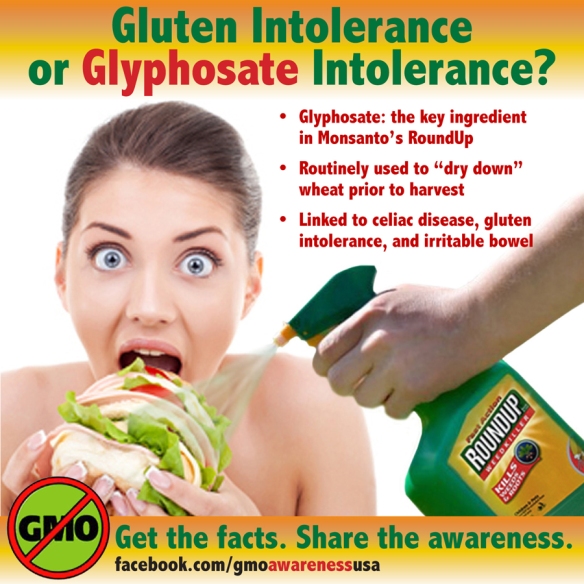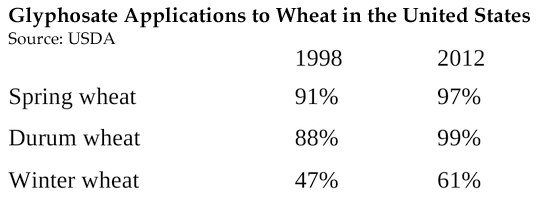New evidence points to glyphosate, the active ingredient in Monsanto’s RoundUp weedkiller, as the culprit in the rise of gluten intolerance, celiac disease and irritable bowel syndrome.
No, this isn’t coming from Monsanto’s test plots of wheat genetically engineered to resist RoundUp (yet). This is coming from a standard practice used on the vast majority of non-organic wheat grown in the United States and other countries…
For more than two decades, non-organic wheat farmers have been routinely using glyphosate as a “crop desiccant” — applied to the field 7-10 days prior to harvest in order to “dry down” the crop for uniformity. Many of these same farmers also use RoundUp during the growing season to assist in weed control. The result?
A “nearly ubiquitous use of glyphosate entering our food chain and making us ill.”
According to the USDA, the percent of glyphosate applied to wheat in 2012 was as follows:
A new peer-reviewed paper published in the Journal of Interdisciplinary Toxicology (Vol. 6(4): 159–184 ) by Doctors Anthony Samsel and Stephanie Seneff shows that celiac disease, gluten intolerance and irritable bowel syndrome are on the rise worldwide, and that rise has taken place in parallel with the increased use of glyphosate (Roundup) herbicide.
Samsel and Seneff researched the known (published) effects of glyphosate along with the known (published) pathologies associated with celiac disease, gluten intolerance and irritable bowel syndrome, through which they identified both chemical and biological pathways where glyphosate can be the cause of these diseases.

“All of the known biological effects of glyphosate – cytochrome P450 inhibition, disruption of synthesis of aromatic amino acids, chelation of transition metals, and antibacterial action – contribute to the pathology of celiac disease,” Samsel and Seneff’s paper states.
A recent estimate suggests that one in twenty people in North America and Western Europe currently suffer from gluten intolerance-related diseases. Meanwhile glyphosate has been linked to a long list of other health and environmental impacts, including crop diseases, birth defects, declines in beneficial insects, disruption of human cells and gut bacteria, DNA damage, and cancer.

Glyphosate (the key ingredient in Monsanto’s Roundup) has become the number one selling herbicide worldwide, due to the increase in the planting of Monsanto’s RoundUp Ready Crops, which are genetically engineered to withstand multiple applications of the weedkiller during the growth cycle.
Despite countless letters and documents submitted in protest, in July 2013, the EPA raised the maximum allowable residues of glyphosate in our food, most likely to accommodate the levels already routinely detected.
Sources:
– Examiner.com “Is it the gluten or is it the glyphosate?”
– USDA: National Agricultural Statistics Service
– More About Glyphosate: GMO-Awareness.com
—
© GMO-Awareness.com 2014. Unauthorized use and/or duplication of this material without express and written permission from this blog is strictly prohibited. Excerpts and links may be used, provided that full and clear credit is given to GMO-Awareness.com with appropriate and specific links back to the original content.





Found this interesting
Thank you for sharing this. I come from a family (3 generations) of gluten-intolerant people who also have a long list of other seemingly random food allergies. Perhaps glyphosate is the connection between them all?
If it’s three generations, how did the 1st gen become gluten intolerant before glyphosate was even created?
Bill, I don’t believe her post said that “three generations ago” her family became gluten intolerant. Those three generations could have had this issue arise over a relatively short time. Glyphosate has been on the market for about 45 years, so…
You’re assuming the first generation became intolerant prior to the use of glyphosate.
We are probably all allergic or intolerant to something and that could be passed down. However, I was able to eat wheat and corn until the past few years. So…..
Reblogged this on teamrich.wordpress.com and commented:
Glyphosate + Wheat linked to gluten intolerance, celiac disease, and irritable bowel syndrome
Reblogged this on MaraMore.com.
Pingback: Glyphosate + Wheat linked to gluten intolerance...
I recently found out that Glyphosate or Roundup is sprayed on sugar cane to cause it to ripen faster, or be more sugary. Now, here, NO, we don’t have RoundupReady wheat, but what’s the dif if sprayed anyway! Maybe we who care should generate a new list called “Glyphosate Sprayed Vegetabes” and forget the gmo part. So many adverse symptoms are the same for GMO as for Glypho.
Spot on Valora! I agree that spray-on chemicals are far more dangerous than GMO. (Any more books coming out??)
Reblogged this on The 1910 Bottling Company Blog and commented:
Another Monsanto roundup….
Reblogged this on Eremophila's Musings and commented:
Considering the massive increase in people’s intolerances, this seems as good a place to look as any.
Pingback: 3 Aug 2014 News and Notes: Guest Call-in (646) 716 9459 | C.O.F.A.H. Open Forum with the Brothers
Pingback: Wheat can kill you… | Retail Bandit
That’s why all rhe beautiful Monkeypod and Earpod trees at Puunene on Maui died. Overspray from aerial spraying . They would deny this of course. Test the soil.It’s still there.
Pingback: Glyphosate classified carcinogenic ... finally ! - Golden Retrievers : Golden Retriever Dog Forums
Pingback: Genetiği Değiştirilmiş Ürünler… | YERELCE
Pingback: This Could Be The Article That Stops You Eating Non-Organic Wheat | Magascope
My husband and father in law have celiacs. My FIL went on a trip to Italy and said that he did not have any problems with gluten while in Italy. They also think its how we are processing our food, in the USA, instead of actual gluten.